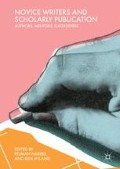Abstract
Journals editors are often seen as gatekeepers in the writing for publication process. Some, however, see reviewers as the key arbiters. In our view, however, the situation is more complex than this. We see editors as mediating between reviewers, authors and the disciplinary community in terms of its expectations for papers in their scholarly journals. This may be in terms of the author’s choice of topic and/or methodology, as well as the contribution that the article makes to the research area. In this chapter, we draw on our own experience to discuss how these issues are considered by editors of academic journals and make suggestions for how novice writers can consider these matters as they submit their work for scholarly publication. We also discuss the challenges junior scholars face in dealing with these matters.
Access this chapter
Tax calculation will be finalised at checkout
Purchases are for personal use only
References
Caffarella, R. S., & Barnett, B. G. (2000). Teaching doctoral students to become scholarly writers: The importance of giving and receiving critiques. Studies in Higher Education,25, 39–52.
Canagarajah, S. (2009). TQ editor’s ponderings. Blogpost: http://www.personal.psu.edu/asc16/blogs/TQeditor/. Accessed December 24, 2017.
Day, A. (1996). How to get research published in journals. Aldershot, UK: Gower Press.
Flowerdew, J. (2001). Attitudes of journal editors to nonnative speaker contributions. TESOL Quarterly, 35, 121–150.
Hyland, K. (2017). Editorial. Journal of English for Academic Purposes,25, 1A.
Iida, A. (2016). Scholarly publication: A multilingual perspective. In C. Macmaster & C. Murphy (Eds.), Graduate study in the USA: Succeeding and surviving (pp. 41–50). New York: Peter Lang.
Langfeldt, L., & Kyvik, S. (2011). Researchers as evaluators: Tasks, tensions and politics. Higher Education, 62, 199–212.
Leki, I. (2003). Tangled webs: Complexities of professional writing. In C. Casanave & S. Vandrick (Eds.), Writing for scholarly publication (pp. 103–112). Mahwah, NJ: Lawrence Erlbaum Associates.
Lillis, T., & Curry, M. J. (2010). Academic writing in a global context: The politics and practices of publishing in English. Abingdon, UK: Routledge.
McKay, S. L. (2003). Reflections on being a gatekeeper. In C. Casanave & S. Vandrick (Eds.), Writing for scholarly publication (pp. 91–102). Mahwah, NJ: Lawrence Erlbaum Associates.
Paltridge, A., & Mahboob, A. (2017). In this issue. TESOL Quarterly,51(7), 53–756.
Paltridge, B. (2013). Learning to review submissions to peer reviewed journals: How do they do it? International Journal for Researcher Development,4, 6–18.
Paltridge, B. (2015). Referees’ comments on submissions to peer-reviewed journals: When is a suggestion not a suggestion? Studies in Higher Education,40, 106–122.
Paltridge, B. (2017). The discourse of peer review. Reviewing submissions to academic journals. London, UK: Palgrave.
Paltridge, B. (2019). Reviewers’ feedback on second language writers’ submissions to academic journals. In K. Hyland & F. Hyland (Eds.), Feedback in second language writing: Contexts and issues (2nd ed.). Cambridge: Cambridge University Press.
Paltridge, B., & Starfield, S. (2016). Getting published in academic journals: Navigating the publication process. Ann Arbor: University of Michigan Press.
Polanyi, M. (1966). The tacit dimension. Garden City, NY: Doubleday and Company.
Rozycki, W., & Johnson, N. H. (2013). Non-canonical grammar in Best Paper award winners in engineering. English for Specific Purposes,32(3), 157–169.
Starfield, S. (2016). A life in review: Writing tasks that academics do that we don’t talk about. Doctoral Writing SIG.https://doctoralwriting.wordpress.com/2016/08/03/a-life-in-review-writing-tasks-that-academics-do-that-we-dont-talk-about/. Accessed December 24, 2017.
Starfield, S. (2017). What examiners value in a PhD. In S. Carter & D. Laurs (Eds.), Developing research writing (pp. 184–188). London: Routledge.
Subitrelu, N. (2016). Denying language privilege in academic publishing. Linguistic Pulse. https://linguisticpulse.com/2016/03/28/denying-language-privilege-in-academic-publishing/. Accessed December 24, 2017.
Thompson, P. (2016). Editorial. Journal of English for Academic Purposes,22, A1.
Thrower, P. (2012). Eight reasons I rejected your article. A journal editor reveals the top reasons so many manuscripts don’t make it to the peer review process. https://www.elsevier.com/connect/8-reasons-i-rejected-your-article Accessed December 24, 2017.
Times Higher Education Supplement (2017, December 14). How to be a great journal editor: Advice from eight top academic editors. https://www.timeshighereducation.com/features/how-be-great-journal-editor-advice-eight-top-academic-editors. Accessed December 24, 2017.
Wellington, J. (2003). Getting published: A guide for lecturers and researchers. London: Taylor and Francis.
Zwaaf, E. (2013). ‘8 reasons I accepted your article’. Journal editors reveal the top reasons a manuscript gets published. https://www.elsevier.com/connect/8-reasons-i-accepted-your-article. Accessed December 24, 2017.
Author information
Authors and Affiliations
Corresponding author
Editor information
Editors and Affiliations
Rights and permissions
Copyright information
© 2019 The Author(s)
About this chapter
Cite this chapter
Starfield, S., Paltridge, B. (2019). Journal Editors: Gatekeepers or Custodians?. In: Habibie, P., Hyland, K. (eds) Novice Writers and Scholarly Publication. Palgrave Macmillan, Cham. https://doi.org/10.1007/978-3-319-95333-5_14
Download citation
DOI: https://doi.org/10.1007/978-3-319-95333-5_14
Published:
Publisher Name: Palgrave Macmillan, Cham
Print ISBN: 978-3-319-95332-8
Online ISBN: 978-3-319-95333-5
eBook Packages: Social SciencesSocial Sciences (R0)

